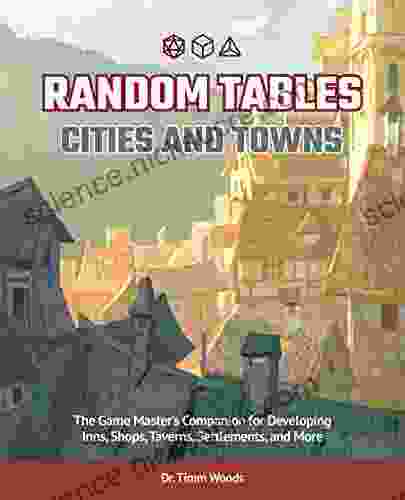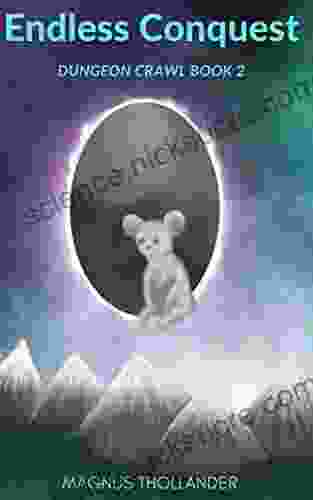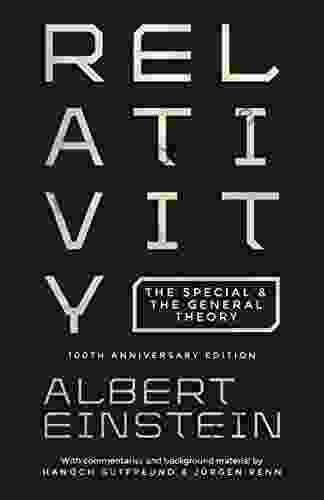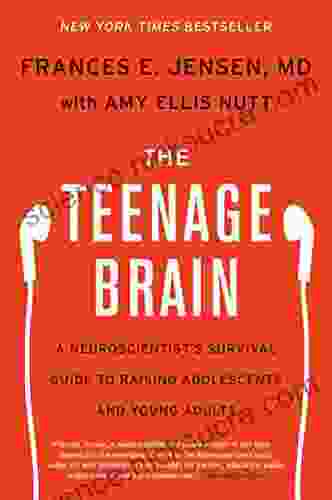The Neuroscientist's Survival Guide to Raising Adolescents and Young Adults: Navigating the Challenges of Brain Development

Adolescence and young adulthood are transformative periods of life, marked by significant physical, emotional, and cognitive changes. These years can be both exhilarating and challenging for both adolescents and their parents. As parents, we want to support our children's growth and development, but we may not always understand the underlying brain changes that are shaping their behavior.
4.6 out of 5
| Language | : | English |
| File size | : | 7169 KB |
| Text-to-Speech | : | Enabled |
| Screen Reader | : | Supported |
| Enhanced typesetting | : | Enabled |
| Word Wise | : | Enabled |
| Print length | : | 372 pages |
| X-Ray | : | Enabled |
In this comprehensive guide, Dr. Patricia Kuhl, a leading neuroscientist and author of the book "The Scientist in the Crib," shares her expert insights on how brain development influences adolescent behavior. She provides practical strategies for navigating the challenges of this critical stage of life, including:
- Understanding the adolescent brain
- Promoting mental health and well-being
- Guiding social and emotional development
- Supporting academic success
- Addressing substance use and mental illness
Understanding the Adolescent Brain
The adolescent brain is undergoing a period of rapid growth and development, which has a significant impact on behavior. Key changes include:
- Increased connectivity: The brain's neural networks become more complex and interconnected, allowing for faster processing and higher-level thinking.
- Prefrontal cortex development: The prefrontal cortex, responsible for executive functions such as planning, decision-making, and impulse control, continues to develop, but is not fully mature until around age 25.
- Limbic system development: The limbic system, responsible for emotions and motivation, is also undergoing development and can be more reactive and intense during adolescence.
These brain changes can lead to a range of behaviors that can be challenging for parents to understand, such as:
- Increased risk-taking
- Mood swings
- Impulsivity
- Difficulty with self-regulation
It's important to remember that these behaviors are a normal part of adolescent development and are not necessarily a sign of a problem. However, it's important to be aware of these changes and to provide support and guidance to your child.
Promoting Mental Health and Well-Being
Adolescence is a time of increased vulnerability for mental health problems, such as depression and anxiety. There are a number of things you can do to promote your child's mental health and well-being, including:
- Encourage open communication: Talk to your child about their feelings and experiences. Let them know that it's okay to ask for help if they're struggling.
- Set realistic expectations: Understand that adolescence is a time of challenges and growth. Don't expect your child to be perfect.
- Provide a supportive environment: Let your child know that you love and support them, no matter what.
- Encourage physical activity: Exercise can help improve mood and reduce stress.
- Limit screen time: Excessive screen time can lead to a number of problems, including sleep deprivation, anxiety, and depression.
If you're concerned about your child's mental health, don't hesitate to seek professional help. A therapist can help your child understand their emotions and develop coping mechanisms.
Guiding Social and Emotional Development
Adolescence is a time of significant social and emotional development. Adolescents are becoming more independent and developing their own sense of identity. They are also beginning to form romantic relationships and explore their values and beliefs.
There are a number of things you can do to guide your child's social and emotional development, including:
- Encourage independence: Allow your child
4.6 out of 5
| Language | : | English |
| File size | : | 7169 KB |
| Text-to-Speech | : | Enabled |
| Screen Reader | : | Supported |
| Enhanced typesetting | : | Enabled |
| Word Wise | : | Enabled |
| Print length | : | 372 pages |
| X-Ray | : | Enabled |
Do you want to contribute by writing guest posts on this blog?
Please contact us and send us a resume of previous articles that you have written.
 Fiction
Fiction Non Fiction
Non Fiction Romance
Romance Mystery
Mystery Thriller
Thriller SciFi
SciFi Fantasy
Fantasy Horror
Horror Biography
Biography Selfhelp
Selfhelp Business
Business History
History Classics
Classics Poetry
Poetry Childrens
Childrens Young Adult
Young Adult Educational
Educational Cooking
Cooking Travel
Travel Lifestyle
Lifestyle Spirituality
Spirituality Health
Health Fitness
Fitness Technology
Technology Science
Science Arts
Arts Crafts
Crafts DIY
DIY Gardening
Gardening Petcare
Petcare Steven Trimble
Steven Trimble Al Barkow
Al Barkow Cat Warren
Cat Warren Micky Ward
Micky Ward Mark Occhilupo
Mark Occhilupo James Gleick
James Gleick Jerry Robertson
Jerry Robertson Terry Breverton
Terry Breverton Gary Player
Gary Player Aileen Nielsen
Aileen Nielsen Mista Nove
Mista Nove Gina Guddat
Gina Guddat William Harding
William Harding Joe Clement
Joe Clement Alan C Acock
Alan C Acock Alan Booth
Alan Booth Aileen Evans
Aileen Evans Marsha Wenig
Marsha Wenig Alan Burdick
Alan Burdick Steven Horak
Steven Horak Alfred S Posamentier
Alfred S Posamentier Steve Moore
Steve Moore Lisa Newton
Lisa Newton George Monbiot
George Monbiot Gillian Gill
Gillian Gill Rose Lynn Fisher
Rose Lynn Fisher Farlex International
Farlex International Dr Guy Leschziner
Dr Guy Leschziner David Vine
David Vine Megan Gray Md
Megan Gray Md Jane Bottomley
Jane Bottomley David Crabtree
David Crabtree Natazha Raine O Connor
Natazha Raine O Connor Ann Hagedorn
Ann Hagedorn Thomas Metzinger
Thomas Metzinger We Fairbairn
We Fairbairn Francesca Lia Block
Francesca Lia Block Sonia Nazario
Sonia Nazario Alice Oseman
Alice Oseman E A Koetting
E A Koetting James Willard Schultz
James Willard Schultz Elaine Howard Ecklund
Elaine Howard Ecklund Robin Mckinley
Robin Mckinley Belinda Luscombe
Belinda Luscombe Mark Drolsbaugh
Mark Drolsbaugh Dave Whitson
Dave Whitson Mary Basick
Mary Basick Roy Dittmann
Roy Dittmann Janice Selekman
Janice Selekman Celeste Jones
Celeste Jones Jay Revell
Jay Revell Erin Lovelace
Erin Lovelace Anthonissa Moger
Anthonissa Moger Ainsley Arment
Ainsley Arment Robert A Sadowski
Robert A Sadowski Alan Shipnuck
Alan Shipnuck Constance Classen
Constance Classen Noha Mellor
Noha Mellor Frank E Harrell Jr
Frank E Harrell Jr Joyce Burkhalter Flueckiger
Joyce Burkhalter Flueckiger Vera Nazarian
Vera Nazarian Alana Chernila
Alana Chernila Alan E Sparks
Alan E Sparks Bob Plott
Bob Plott Hope Smith
Hope Smith Jay Speight
Jay Speight Penney Peirce
Penney Peirce Mel Thompson
Mel Thompson Pavel Tsatsouline
Pavel Tsatsouline Rehana Jawadwala
Rehana Jawadwala Vanessa Ogle
Vanessa Ogle Andrew Rowe
Andrew Rowe Pantea Kalhor
Pantea Kalhor Bob Mayer
Bob Mayer Alan Vermilye
Alan Vermilye Christopher Hellman
Christopher Hellman Dave Heller
Dave Heller George E Andrews
George E Andrews Patrick O Sullivan
Patrick O Sullivan Percy Boomer
Percy Boomer Takuan Soho
Takuan Soho Al Roker
Al Roker Celeste Headlee
Celeste Headlee Leif K Karlsen
Leif K Karlsen Barbara Scott
Barbara Scott Contractor Education Inc
Contractor Education Inc Edward A Tiryakian
Edward A Tiryakian Florence Williams
Florence Williams Bill Walker
Bill Walker Cindy Hudson
Cindy Hudson Akil Palanisamy
Akil Palanisamy Isabella Morris
Isabella Morris Kristine Barnett
Kristine Barnett Nina Lacour
Nina Lacour Alana Mclaren
Alana Mclaren Jerry Robeson
Jerry Robeson Anders Halverson
Anders Halverson Lexie Scott
Lexie Scott Dimitri Loose
Dimitri Loose Len Sperry
Len Sperry J R Haseloff
J R Haseloff Steven H Strogatz
Steven H Strogatz Mariam N Ottimofiore
Mariam N Ottimofiore Brian Mills
Brian Mills I Johnson
I Johnson Gill Rapley
Gill Rapley Franz Metcalf
Franz Metcalf Howard Maxwell
Howard Maxwell Al Desetta M A
Al Desetta M A Jay H Lefkowitch
Jay H Lefkowitch Paramahansa Yogananda
Paramahansa Yogananda Kate Bettison
Kate Bettison William Foote Whyte
William Foote Whyte Peter Ballingall
Peter Ballingall Tod E Bolsinger
Tod E Bolsinger Jessica Battilana
Jessica Battilana Jeanne Faulkner
Jeanne Faulkner Juno Roche
Juno Roche Teresa Mccallum
Teresa Mccallum Ndeye Labadens
Ndeye Labadens Ilan Dvir
Ilan Dvir Kerry Diamond
Kerry Diamond Nassim Nicholas Taleb
Nassim Nicholas Taleb Suze Guillaume
Suze Guillaume Douglas Noll
Douglas Noll Kevin Williams
Kevin Williams Alan S Kaufman
Alan S Kaufman Al Owens
Al Owens Sam J Fires
Sam J Fires Julie Bradley
Julie Bradley Tom Shachtman
Tom Shachtman David F Kelly
David F Kelly Noel St Clair
Noel St Clair Rick Bass
Rick Bass Robert L Kelly
Robert L Kelly Zita West
Zita West Mark Goulston
Mark Goulston Helen Hollick
Helen Hollick Jeff Maynard
Jeff Maynard Judith Garrard
Judith Garrard Joanne Webb
Joanne Webb Miles Mckenna
Miles Mckenna Anna Hickey Moody
Anna Hickey Moody Erica Westly
Erica Westly Harriet Brown
Harriet Brown Magnus Thollander
Magnus Thollander Molly Absolon
Molly Absolon Lisa Kenney
Lisa Kenney Marcus Chown
Marcus Chown Tonya Johnston
Tonya Johnston Jessica Cunsolo
Jessica Cunsolo Snap Summaries
Snap Summaries Dylan Alcott
Dylan Alcott Timothy C Smith
Timothy C Smith Morgan Lyle
Morgan Lyle George M Fredrickson
George M Fredrickson Spencer Wells
Spencer Wells Jessica Cornwell
Jessica Cornwell Hannah Ewens
Hannah Ewens Carla Schroder
Carla Schroder John Bird
John Bird James Witts
James Witts The Rogue Hypnotist
The Rogue Hypnotist Alastair Humphreys
Alastair Humphreys Charles B White
Charles B White Amy Edelstein
Amy Edelstein Daniel C Okpara
Daniel C Okpara Richard Pears
Richard Pears Craig Childs
Craig Childs Melinda Rushe
Melinda Rushe Cynthia Clumeck Muchnick
Cynthia Clumeck Muchnick Alan Hearnshaw
Alan Hearnshaw Anne Enright
Anne Enright Peter Irvine
Peter Irvine Bill Parisi
Bill Parisi Aphra Behn
Aphra Behn Vishwesh Bhatt
Vishwesh Bhatt Samuel Carbaugh
Samuel Carbaugh Al Marlowe
Al Marlowe Bryon Powell
Bryon Powell Leigh Sales
Leigh Sales Nicholas Romanov
Nicholas Romanov Jill Stamm
Jill Stamm Caitlin Zaloom
Caitlin Zaloom Yang Jwing Ming
Yang Jwing Ming Gordon H Orians
Gordon H Orians Habeeb Quadri
Habeeb Quadri Joe Berardi
Joe Berardi Martin J Pring
Martin J Pring Michael Morpurgo
Michael Morpurgo Alex Light
Alex Light John J Miller
John J Miller Alan Margot
Alan Margot W E Fairbairn
W E Fairbairn John Irving
John Irving Vasilis Konstantinos Giontzis
Vasilis Konstantinos Giontzis Aitzaz Imtiaz
Aitzaz Imtiaz Alan Graham
Alan Graham Gary R Varner
Gary R Varner David A Sousa
David A Sousa Howard Greene
Howard Greene Susan B Lovejoy
Susan B Lovejoy Andy Zipser
Andy Zipser Alan Garner
Alan Garner Mykel Hawke
Mykel Hawke Steve Michalik
Steve Michalik Michael Miller
Michael Miller Ron L Deal
Ron L Deal Rob Casey
Rob Casey Larry Wasserman
Larry Wasserman Truman Everts
Truman Everts Mackenzi Lee
Mackenzi Lee Laurie Pickard
Laurie Pickard Martin Luther King Jr
Martin Luther King Jr Brandy Roon
Brandy Roon Sophia Joy
Sophia Joy Martin Erwig
Martin Erwig Gregory J Davenport
Gregory J Davenport Will Storr
Will Storr Martin Rooney
Martin Rooney Jacqueline Fitzpatrick
Jacqueline Fitzpatrick Mike Martin
Mike Martin Nick Hughes
Nick Hughes Roxy And Ben Dawson
Roxy And Ben Dawson Esther Parry
Esther Parry Kim Stanley Robinson
Kim Stanley Robinson Publishdrive Edition Kindle Edition
Publishdrive Edition Kindle Edition John Feinstein
John Feinstein M K Hume
M K Hume Margit Ystanes
Margit Ystanes John Riley
John Riley Shing Tung Yau
Shing Tung Yau Stephanie Izard
Stephanie Izard Al Strachan
Al Strachan R A Salvatore
R A Salvatore Thomas Kurz
Thomas Kurz Scott Surovich
Scott Surovich Jenni Hicks
Jenni Hicks Amye Archer
Amye Archer Markus Rex
Markus Rex Arthur Fleischmann
Arthur Fleischmann Robert Heidler
Robert Heidler Michael Domican
Michael Domican Jacqueline Church Simonds
Jacqueline Church Simonds Massad Ayoob
Massad Ayoob Frances E Jensen
Frances E Jensen Al Macy
Al Macy Robert Macfarlane
Robert Macfarlane Nilakantasrinivasan J Neil
Nilakantasrinivasan J Neil Marc M Triola
Marc M Triola Gavin Francis
Gavin Francis Donna Morang
Donna Morang Donald Woods Winnicott
Donald Woods Winnicott John H Moore
John H Moore Katharine Graves
Katharine Graves Lecile Harris
Lecile Harris Aiva Books
Aiva Books Letisha Galloway
Letisha Galloway Chris Klug
Chris Klug Alan Lightman
Alan Lightman Helen Palmer
Helen Palmer Rene D Zweig
Rene D Zweig John T Hansen
John T Hansen Al Yellon
Al Yellon Gary B Ferngren
Gary B Ferngren Kevin Hunter
Kevin Hunter Elizabeth Thompson
Elizabeth Thompson Collins Easy Learning
Collins Easy Learning Matt Mosher
Matt Mosher Mendocino Press
Mendocino Press Al Sweigart
Al Sweigart Jamie Baulch
Jamie Baulch G H Hardy
G H Hardy Benjamin Johnston
Benjamin Johnston Mark Harris
Mark Harris Carl Gustav Jung
Carl Gustav Jung Orson Scott Card
Orson Scott Card William A Kaplin
William A Kaplin Rebekah Sack
Rebekah Sack Andrea Travillian
Andrea Travillian Toby Wilkinson
Toby Wilkinson Kiku Hughes
Kiku Hughes Alan E Kazdin
Alan E Kazdin Matthew Sturm
Matthew Sturm Michael Gray
Michael Gray Aidan Chambers
Aidan Chambers Terry L Duran
Terry L Duran Denise Alvarado
Denise Alvarado Jane Poynter
Jane Poynter Grace Lebow
Grace Lebow Emily Harris Adams
Emily Harris Adams G E R Lloyd
G E R Lloyd S A Klopfenstein
S A Klopfenstein Alan Lawrence Sitomer
Alan Lawrence Sitomer Harold Klemp
Harold Klemp Kerstin Gier
Kerstin Gier Aimee Aristotelous
Aimee Aristotelous Dorothy H Crawford
Dorothy H Crawford Terry Funk
Terry Funk Robert E Stake
Robert E Stake Al Ristori
Al Ristori Margaret J Wheatley
Margaret J Wheatley Thubten Chodron
Thubten Chodron Vernon Coleman
Vernon Coleman Alan Rouse
Alan Rouse Barbara Oehlberg
Barbara Oehlberg Lisa Marasco
Lisa Marasco Stephen Wolfram
Stephen Wolfram Edupan7 Publishing
Edupan7 Publishing Bianca Smith
Bianca Smith Alan Murchison
Alan Murchison Lo Bosworth
Lo Bosworth Eden O Neill
Eden O Neill Kelly Jensen
Kelly Jensen Linda Welters
Linda Welters Timm Woods
Timm Woods Alice Scordato
Alice Scordato Nick Lyons
Nick Lyons Sandy Lindsey
Sandy Lindsey Sara Hanover
Sara Hanover Alan S Gurman
Alan S Gurman Albert Einstein
Albert Einstein George Plimpton
George Plimpton Anahad O Connor
Anahad O Connor Jim Steenburgh
Jim Steenburgh Deitra Leonard Lowdermilk
Deitra Leonard Lowdermilk Helena Clare
Helena Clare Jill Homer
Jill Homer Chris Vines
Chris Vines Pallas Snider
Pallas Snider Jan Smith
Jan Smith Tina Dreffin
Tina Dreffin Stephen M Camarata
Stephen M Camarata Saul Rip
Saul Rip Jacob K Olupona
Jacob K Olupona Rand Cardwell
Rand Cardwell Bill Friedrich
Bill Friedrich Kevin B Shearer
Kevin B Shearer Mark Booth
Mark Booth Peg Tyre
Peg Tyre Juliet Marillier
Juliet Marillier Mike Rothschild
Mike Rothschild Tim Gallagher
Tim Gallagher Aidan Dodson
Aidan Dodson Andy Adams
Andy Adams Christopher Gavigan
Christopher Gavigan Carol Tuttle
Carol Tuttle Christopher Scordo
Christopher Scordo Angelina Wilson
Angelina Wilson Douglas G Altman
Douglas G Altman Courtney Macavinta
Courtney Macavinta Hammad Fozi
Hammad Fozi Anne Dachel
Anne Dachel Bradley Efron
Bradley Efron Princess Her
Princess Her Kate Brian
Kate Brian Douglas T Hall
Douglas T Hall Dennis Jarecke
Dennis Jarecke Charles J Thayer
Charles J Thayer Jeremy Miles
Jeremy Miles Lingo Mastery
Lingo Mastery Gayle Peterson
Gayle Peterson Dmitry Zinoviev
Dmitry Zinoviev Dan Dipiro
Dan Dipiro Aileen Erin
Aileen Erin Brenda Nathan
Brenda Nathan Jakob Tanner
Jakob Tanner Lauren Blackwood
Lauren Blackwood John Leo
John Leo Jay Annelli
Jay Annelli Andrew Jamieson
Andrew Jamieson Dean Burnett
Dean Burnett Tenth Edition Revised Kindle Edition
Tenth Edition Revised Kindle Edition Emeran Mayer
Emeran Mayer Michal Stawicki
Michal Stawicki Amelia Simmons
Amelia Simmons Chris Bowers
Chris Bowers Judy Jewell
Judy Jewell Lee Carroll
Lee Carroll Rosemarie Anderson
Rosemarie Anderson Original Edition Kindle Edition
Original Edition Kindle Edition Gail Tully
Gail Tully Sarah Hendrickx
Sarah Hendrickx Zondervan
Zondervan Jacqueline Tourville
Jacqueline Tourville Shoshana Levin Fox
Shoshana Levin Fox Jonathan White
Jonathan White David King
David King Theodore P Jorgensen
Theodore P Jorgensen Alan Gelb
Alan Gelb Hiro Ainana
Hiro Ainana Shaun Tomson
Shaun Tomson David D Burns
David D Burns Satya Sundar Sethy
Satya Sundar Sethy Layla Moon
Layla Moon Sir Edmund Hillary
Sir Edmund Hillary George Knudson
George Knudson Po Bronson
Po Bronson Trevor Lund
Trevor Lund Paul G Schempp
Paul G Schempp Michael Shermer
Michael Shermer S Connolly
S Connolly Dawn Sakamoto Paiva
Dawn Sakamoto Paiva Michael Sidgwick
Michael Sidgwick Madeline Milne
Madeline Milne Alan Watts
Alan Watts Conor Daly
Conor Daly James F Boswell
James F Boswell Gordon R Dickson
Gordon R Dickson Daphne Rose Kingma
Daphne Rose Kingma Jordon Greene
Jordon Greene Jane P Gardner
Jane P Gardner Clyde Fitch
Clyde Fitch Billy Walsh
Billy Walsh Dr David Geier
Dr David Geier Meredith Marsh
Meredith Marsh Bruce Lee
Bruce Lee David Jason
David Jason Ken Schultz
Ken Schultz Al Pasha
Al Pasha United States Government Us Marine Corps
United States Government Us Marine Corps Karen Levin Coburn
Karen Levin Coburn Taquetta Baker
Taquetta Baker Michael Casey
Michael Casey Beata Bliss Lewis Md
Beata Bliss Lewis Md Clint Emerson
Clint Emerson Kidada Jones
Kidada Jones Bryan Mann
Bryan Mann Don Casey
Don Casey Louis Schubert
Louis Schubert Ai Publishing
Ai Publishing Eddy Starr Ancinas
Eddy Starr Ancinas Josh Kilmer Purcell
Josh Kilmer Purcell Akwaeke Emezi
Akwaeke Emezi Jackson Katz
Jackson Katz Bruce J Macfadden
Bruce J Macfadden Graham Bower
Graham Bower Bobby Flay
Bobby Flay Ken Denmead
Ken Denmead Linda G Morris
Linda G Morris John Muir
John Muir J Zoltan
J Zoltan Matthew Mcbee
Matthew Mcbee Alan R Hall
Alan R Hall James A Michener
James A Michener Kareem Abdul Jabbar
Kareem Abdul Jabbar Melissa Bashardoust
Melissa Bashardoust Peter Hathaway Capstick
Peter Hathaway Capstick Antipodean Writer
Antipodean Writer Lex Croucher
Lex Croucher Wayne Stewart
Wayne Stewart Mike Warren
Mike Warren Arnold Haultain
Arnold Haultain George Buehler
George Buehler Gary Smith
Gary Smith Arnold Yates
Arnold Yates Ahmed Osman
Ahmed Osman Jon Tyson
Jon Tyson Charlotte Markey
Charlotte Markey Rebecca Jones
Rebecca Jones Damon Lee
Damon Lee Andrew Blum
Andrew Blum Jon Emmett
Jon Emmett Alaina Talboy
Alaina Talboy Jonathan Gottschall
Jonathan Gottschall Betsy Tobin
Betsy Tobin Sheila Barton
Sheila Barton Hervey Garrett Smith
Hervey Garrett Smith 12th Edition Kindle Edition
12th Edition Kindle Edition Aidan Comerford
Aidan Comerford Aja Raden
Aja Raden Ged Jenkins Omar
Ged Jenkins Omar E Cheng
E Cheng Dr Joseph Parent
Dr Joseph Parent Alan Porter
Alan Porter Olivia Gentile
Olivia Gentile Samuel N Rosenberg
Samuel N Rosenberg Kardas Publishing
Kardas Publishing Skeleton Steve
Skeleton Steve Janet Houser
Janet Houser Howard Hill
Howard Hill Kiersten White
Kiersten White Amanda Ford
Amanda Ford Christopher Willard
Christopher Willard Joe Bertagna
Joe Bertagna Kai Nacke
Kai Nacke Robert M Emerson
Robert M Emerson Deborah Harkness
Deborah Harkness Doug Gelbert
Doug Gelbert Michael W King
Michael W King Bettina Gordon Wayne
Bettina Gordon Wayne Amelia Mayer
Amelia Mayer David Roberts
David Roberts Catherine Belknap
Catherine Belknap Michael Freedland
Michael Freedland Christos A Djonis
Christos A Djonis Michael D Rich
Michael D Rich Andre Agassi
Andre Agassi Dusty Rhodes
Dusty Rhodes Sara Wickham
Sara Wickham Jack Nicklaus
Jack Nicklaus Lj Andrews
Lj Andrews Erin Ekins
Erin Ekins Nancy Hughes
Nancy Hughes
Light bulbAdvertise smarter! Our strategic ad space ensures maximum exposure. Reserve your spot today!

 John GrishamThe Game Master's Companion for Developing Inns, Shops, Taverns, Settlements,...
John GrishamThe Game Master's Companion for Developing Inns, Shops, Taverns, Settlements,...
 Elias MitchellThe Further Adventures of a Northwoods Game Warden: Tales, Wisdom, and Humor...
Elias MitchellThe Further Adventures of a Northwoods Game Warden: Tales, Wisdom, and Humor... Yasushi InoueFollow ·19.8k
Yasushi InoueFollow ·19.8k Shawn ReedFollow ·2.4k
Shawn ReedFollow ·2.4k Orson Scott CardFollow ·18.6k
Orson Scott CardFollow ·18.6k Ignacio HayesFollow ·2.1k
Ignacio HayesFollow ·2.1k Francis TurnerFollow ·17.2k
Francis TurnerFollow ·17.2k Alvin BellFollow ·6.3k
Alvin BellFollow ·6.3k Brenton CoxFollow ·10k
Brenton CoxFollow ·10k Chadwick PowellFollow ·18.2k
Chadwick PowellFollow ·18.2k

 Deacon Bell
Deacon BellCompilation of Short Stories on Mental Illness and Ways...
Mental illness is a serious issue that affects...

 Jonathan Hayes
Jonathan HayesThe Practical Guide to Raising Courageous and...
As parents, we all want...

 Carlos Fuentes
Carlos FuentesA Journey to Remember: The High Sierra Love Story of...
Prologue: A Wilderness Encounter Beneath...

 Douglas Foster
Douglas FosterEndless Conquest: Embark on an Immersive Dungeon Crawl in...
Endless Conquest is a captivating LitRPG...

 Caleb Long
Caleb LongThe Special and the General Theory 100th Anniversary...
The year 2015 marks a...
4.6 out of 5
| Language | : | English |
| File size | : | 7169 KB |
| Text-to-Speech | : | Enabled |
| Screen Reader | : | Supported |
| Enhanced typesetting | : | Enabled |
| Word Wise | : | Enabled |
| Print length | : | 372 pages |
| X-Ray | : | Enabled |










